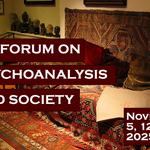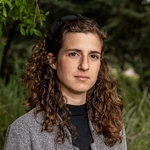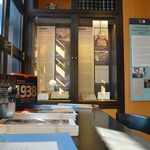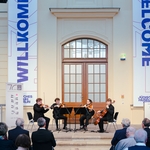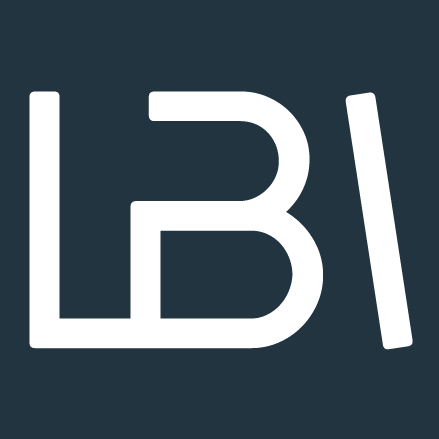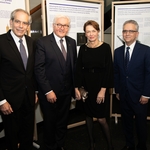Leo Baeck Medal for Frank-Walter Steinmeier
Featuring Ambassador Ronald S. Lauder






- Date
- Fri, Nov 19, 2021
On Thursday, November 18, 2021, the Leo Baeck Institute – New York | Berlin (LBI) presented the Leo Baeck Medal to Frank-Walter Steinmeier, the Federal President of Germany. LBI President Dr. David Marwell presented the German head of state with the honor at a gala dinner in the Center for Jewish History, New York. Businessman, philanthropist, and President of the World Jewish Congress Ronald S. Lauder gave the Laudatio.
The LBI honored Steinmeier for his longtime engagement in preserving and promoting Jewish life in contemporary Germany, as well has his commitment to preserving the memory of the Jewish past in Germany. The president is the official patron of “2021 JLID – 1700 Years of Jewish Life in Germany”, a year-long festival celebrating Jewish life in Germany and exploring Jewish history. The LBI has contributed to the festival with its “Shared History Project”, an online exhibition that explores the long history of Jewish life in German-speaking countries beginning with a Roman Edict concerning the Jews of Cologne in 321 CE.
Lauder praised Steinmeier for speaking out forcefully against antisemitism: “We are witnessing the greatest rise in antisemitism since the end of war in 1945. At a time when too many world leaders are silent … there is one man who speaks forcefully and with great moral force … and that is you, Mr. President.”
In his acceptance speech, Steinmeier emphasized the legacy of Rabbi Leo Baeck, the last leader of Germany’s organized Jewish communities, who survived the Theresienstadt Ghetto. He also spoke of the “miracle” of reconciliation: “This miracle did not fall from heaven ‒ people gave us this gift! So many Jews, survivors of the Shoah and their descendants from Europe, Israel, and the United States opened the eyes of post-war Germans. So many of them reached out their hand to us Germans, and we grasped them gratefully. Only thanks to and with these people were we able to follow the long path of reconciliation started by Leo Baeck.”
Remarks by Federal President Frank-Walter Steinmeier
My dear Ronald Lauder, thank you for your wonderful tribute. I am moved and touched by your words.
Thank you for preserving and sharing the legacy of one of the most important Jewish-German scholars. Words can hardly express how grateful I am to you for inviting me to New York. I feel deeply honored and humbled by this award.
I come from a generation that did not experience the great Leo Baeck in person. But we were able to learn so much from him. He showed us how much hope, faith, and optimism German Jews had before the barbarity of the Nazis almost completely erased Jewish life in Germany and many parts of Europe. Leo Baeck ‒ and this is his legacy ‒ pursued reconciliation between the religions and cultures, between Christians and Jews in Germany. How much it must have pained him to see his Germany plunge into the darkest night! And what terrible suffering he himself had to endure! The Nazis wanted to murder even him, a man who had devoted his life to dialogue, because he was a Jew.
Not surprisingly, even this great believer in reconciliation lost all hope after the Shoah, that betrayal of all civilized values. You will be familiar with his profoundly resigned conclusion that the history of the Jews of Germany had come to an end. "So much murder, theft, and plunder, so much blood and tears, so many graves. That cannot be erased," he said.
I myself have always understood this bitter and despairing analysis as a duty to help ensure a new start across the deepest of abysses, to help foster new Jewish life in Germany!
I want to bow today before Leo Baeck, before the man who ‒ astoundingly ‒ found new hope in the last years of his life, as you describe in your wonderful biography, Michael Meyer. This hope mainly came from Theodor Heuss, the first Federal President ‒ hope for a new, democratic Germany, where very gradually a few Jewish communities were reemerging.
When I stand before you today 70 years later as the twelfth President of Germany, I feel grateful for and humbled by the miracle of reconciliation bestowed on my country and me. This miracle did not fall from heaven ‒ people gave us this gift! So many Jews, survivors of the Shoah and their descendants from Europe, Israel, and the United States opened the eyes of post-war Germans. So many of them reached out their hand to us Germans, and we grasped them gratefully. Only thanks to and with these people were we able to follow the long path of reconciliation started by Leo Baeck.
These are the people I am thinking about this evening ‒ those who spoke frankly and reached out their hand to me, those who offered me their friendship. Although I can only mention a few selected names now, I would like to thank each and every one of them from the bottom of my heart. I know that without these people, without their friendship, without their gift of reconciliation, I would be a different person today. I would like to dedicate today’s award to all of them.
Margot Friedländer gave us the miracle of reconciliation. A native of Berlin who turned 100 just a few days ago, she was the sole member of her family to survive the Shoah. Only at a very advanced age did she move back from New York to Berlin, her beloved home town. She now travels tirelessly through the same streets where she was mocked and insulted as a young girl to speak about her experiences and to show young people today how precious freedom and democracy are. "I believe in the good in people," Margot Friedländer once said. What a sentence!
Regina and Zwi Steinitz, two very special people, also gave us the miracle of reconciliation. I first met Zwi during a visit in Sachsenhausen. When I think about him, I remember his smile. I will never forget it. Both Regina and Zwi went through hell as children. They began a new life together in Israel. And they, too, decided to share their story with others. Regina still does so today, and at her advanced age regularly travels from Israel to Germany. I have often seen how young people hang on her every word when she speaks and how these young Germans are deeply touched by her experiences. My own daughter was so moved by the story of Regina and Zwi that she visited them at home in Israel. How thankful I am for their friendship!
I would also like to thank Kurt Marx for the miracle of reconciliation. I had the honor of meeting him in Maly Trostenets, in that place of terror situated in what is now Belarus, where the Nazis brutally murdered tens of thousands of Jewish families, including Kurt Marx’s parents. He saw them for the last time as a child before he fled from Cologne to England. Maly Trostenets is just one of the many sites of German crimes of which far too few people are aware in today’s Germany. Such places include Paneriai in Lithuania and Babyn Jar and Odessa in Ukraine. It is important to me that we Germans know about these places, that they have a name, and that they have a place in our memory.
I am thinking this evening about the people who open up these spaces for us ‒ of Anita Lasker-Wallfisch, Leon Schwarzbaum, Pavel Taussig and Peter Gardosch, of Walter Jacob and Giselle Cycowicz. I am thinking of all Holocaust survivors, the last people who can bear witness. They speak about what happened so that it never happens again! They have dedicated their lives to the fight against forgetting, doing so across borders and continents. I am thinking of people such as Roman Kent, whom we sadly lost a few months ago; people such as Marian Turski, the President of the International Auschwitz Committee, who accompanied me on a visit of the Museum of the History of Polish Jews in Warsaw which he co-founded. We have seen each other many times in the past years, most recently at Roman Kent’s remembrance service in August. I am profoundly grateful for his friendship, a friendship I also had the privilege of experiencing when I was in Wieluń and Warsaw on the 1st of September, 2019, the 80th anniversary of the day on which my country invaded his and unleashed horrific suffering on him, his family, and his fellow Poles.
I am also grateful to my friend Reuven Rivlin for the miracle of reconciliation. Our first meeting took place over a couple of beers in the bars in Mahane Yehuda in Jerusalem; our second was a visit to Dachau concentration camp. This grew into the kind of friendship you don’t often find in politics. This summer, I visited him for the last time during his term as President of Israel. On that occasion, I was extremely moved to be able to give him his father’s diploma of 1926 from the University of Frankfurt. And I will never forget how he, Ruvi, led me to the grave of the founder of the State of Israel, David Ben-Gurion, in the Negev desert.
One of the most moving moments of my term in office was when Ruvi invited me to speak at Yad Vashem, and our joint visit to Auschwitz afterwards. Who could have imagined just a few years ago that a German and an Israeli President, the one who had once protested angrily against diplomatic relations with Germany, that these two men would fly together to Berlin on a German airforce plane after visiting the former death camp? President Rivlin held a moving speech at the German Bundestag in Berlin. This, too, is an absolute miracle! I am so thankful for the hand that Ruvi Rivlin extended to us Germans and to me personally in reconciliation that I am hardly able to put it in words!
And I am grateful to many other Israelis, whom I have the privilege of calling my friends today. I am thinking of Ruvi’s successor, Isaac Herzog, whom I have known for many, many years. We have gone through political highs and lows together ‒ yes, we have had our fair share of both! The two of us recently attended the memorial ceremony in Babyn Jar for the Jews of Kyiv who were so cruelly murdered 80 years ago.
I am thinking of the great Shimon Peres, whom I met many times. I had the privilege of spending an unforgettable day with him at the Hebrew University of Jerusalem on Mount Scopus. I am thinking of Avi Primor, Avner Shalev, and so many others. I am thinking of Shimon Stein, who would have loved to come to New York with us today. At times it seems totally normal to us Germans how close and ordinary our ties are with our Israeli friends. But let us never forget that this is a miracle!
David Grossman is also part of the miracle of reconciliation for me. My visits to him and our conversations count among the best moments of my life. But something David said to me when we met in 2006 is one of my most bitter memories. In those days I was in Israel as German Foreign Minister, and an agreement had almost been reached on a ceasefire in the Lebanon war. When we said goodbye in the King David Hotel, he told me that for the first time in his life, he was afraid. It was as if he had seen the future. His son Uri, who was only 21, was killed in the very final hours of that war. He died trying to rescue his comrades from their tank, which had come under attack. Who can imagine what pain David suffered? I am grateful to David Grossman for so much. His books have given countless Germans such as me an insight into the tragic and fascinating universe of Israel.
And so many other artists, writers, musicians, actors, and intellectuals from Israel have also been a source of insight and inspiration to me ‒ Amos Oz, Aliza Olmert, Amnon Weinstein, Assaf Gavron, and many, many more.
I also experienced the miracle of reconciliation in Germany from a wonderful woman who survived the Nazi years by going into hiding and decided to stay in the country. Charlotte Knobloch is the very epitome of Jewish life in her home town of Munich. For decades now, she has been a voice that cannot be ignored in the fight against antisemitism in Germany. She has been a guide to so many people, especially young people! I am grateful to this unique friend for so many things ‒ for her excellent listening skills, her intelligent analyses, and her occasional advice. Like many Germans, I was particularly impressed by her speech in the German Bundestag on this year’s Holocaust Remembrance Day. "I stand before you as a proud German," she said, words by this proud, outspoken Jewish German that will echo for a long time to come.
The miracle of reconciliation ‒ the words of the second speaker at the same remembrance ceremony also still echo in our minds. Marina Weisband, who was born in Ukraine and came to Germany with her parents as a child, belongs to the young generation of Jewish people who live in Germany today and are helping to shape our country. Thanks to people like her, Jewish life in Germany is now vibrant, diverse, and forward-looking once again. What an immense stroke of good fortune for our country!
I wish that Leo Baeck could see them all and experience how they are shaping Jewish life in Germany today. Such different people like Josef Schuster, Rabbi Walter Homolka, and Rabbi Yehuda Teichtal, people such as Daniel Donskoy, Susan Neiman and Rachel Salamander, Abraham Lehrer and Shelly Kupferberg. What a pleasure it was to celebrate 1,700 Years of Jewish Life in Germany together in Cologne Synagogue! The anniversary year is now coming to an end, and I can only hope that it has shown many Germans that Jewish life has been a part of Germany for centuries. How much poorer our country would be without Jewish life! And I do not want to imagine Germany without Jewish life ever again!
I have also experienced the miracle of reconciliation here in New York, here in America. Allow me to single out a person whom I visited only this morning, just a few blocks from here. A boy from a middle-class home in Fürth, who fled with his parents from Nazi Germany ‒ and who became one of the great thinkers and an architect of global policy here in his new home in the United States. I remember well how much it moved us all at a dinner at Schloss Bellevue in honor of his 95th birthday when Henry Kissinger described how he and his family were forced to leave Germany. And yet he later became one of our greatest friends. We Germans feel close to him, and not only because of his endearing southern German accent, which is still unmistakeable today when he speaks the language of his childhood. He has also remained close to his native city of Fürth ‒ not to mention its football club! I have learned so much from him. And I am so grateful for the advice he has given me over the years.
I would like to thank you, my dear Ronald Lauder, for your efforts to foster reconciliation and to combat antisemitism. It is of particular importance to you that new Jewish life develops in eastern European countries. I am impressed by that. I am equally impressed by your delight in art and your passion for collecting it! And you have another passion, one I have seen for myself each time we met, namely transatlantic relations. I know what a great friend Germany has in you. From the bottom of my heart, thank you for this!
I am thinking about all of these people this evening. They reached out their hand to me. They gave me their friendship. I would also like to thank you, tonight’s guests, and you, my dear William Weitzer and my dear David Marwell, and the entire Leo Baeck Institute, which does such indescribably important work. You are the miracle we are celebrating today.
For me and for us Germans, reconciliation is an eternally valuable gift. However, it remains fragile, it can be attacked, and indeed it is attacked every single day.
In Germany of all places, the evil of antisemitism has manifested itself far more openly and blatantly in recent years once again. Not only does this pain me, it also shames and infuriates me!
I would so much love to be able to say that Jewish life in Germany is uncontested normality today, that Jewish institutions no longer need to be protected. Instead, we saw a nightmare come to life on October 9, 2019. On the holiest day of the Jewish year, a right-wing extremist attacked a packed synagogue in Halle, and only a heavy wooden door prevented him from carrying out a mass murder. Since then, Jewish people ask themselves if they are truly safe in the country of the perpetrators of old. That, too, shames and infuriates me!
I would like to assure you today that there can be only one response to that for us Germans.
That is what I mean when I speak about Leo Baeck and the duty his legacy entails for me. Our responsibility to history is part of our identity. History knows no closure and our past will never be downplayed. We cannot, and we will not, tolerate antisemitism in Germany! As a Head of State and as a human being, I will continue to fight for that. It is my profoundly held conviction that only when Jews feel completely at home in Germany again, when they feel completely safe, only then will Germany be completely at peace with itself.
Thank you very much!
Latest News
